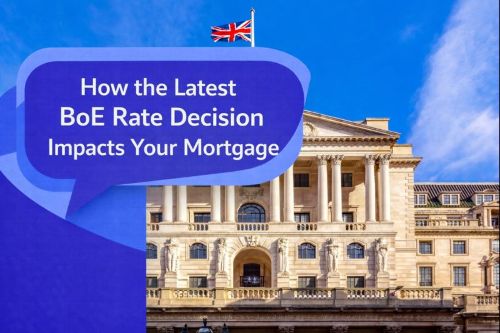How the Latest BoE Rate Decision Impacts Your Mortgage: The Bank of England’s recent interest rate decision has caught the attention of homeowners, mortgage advisers, and lenders alike. In today’s uncertain financial climate, understanding how this rate change influences your mortgage – and what steps you should take next – is more important than ever.
Whether you’re currently locked into a fixed-rate deal, considering a new purchase, or exploring refinancing options, knowing how rate adjustments impact your monthly repayments and long-term financial health can help you plan more confidently.
In this guide, we unpack what the BoE’s rate move means for borrowers, highlight practical ways to respond, and explain how advisers can support clients during periods of change.
What Did the Bank of England Decide?
The Bank of England (BoE) regularly reviews interest rates as part of its commitment to maintaining inflation stability and economic health. In its most recent announcement, the BoE opted to adjust the base rate in response to ongoing inflation trends, energy costs, and wage growth pressures.
This decision plays a critical role in shaping how lenders price mortgages, savings, and other borrowing products. For mortgage borrowers, a rate change affects affordability and choice.
How Does the Rate Decision Affect Mortgage Borrowers?
Interest rate changes directly affect mortgage affordability, particularly for borrowers with variable, tracker, or soon-to-expire fixed-rate deals.
If you’re on a variable or tracker mortgage:
- Your monthly payments may increase or decrease in line with the base rate shift.
- Budgeting becomes less predictable, so it’s important to review affordability and consider locking into a fixed deal if appropriate.
If your fixed rate is ending within 6 to 12 months:
- You may face higher reversion rates if no new deal is secured in advance.
- Early planning can help you avoid unexpected costs or payment shocks.
If you’re applying for a mortgage:
- Lender affordability checks may become more stringent.
- Borrowing power could be reduced, depending on the size of the rate increase.
It’s important to remember that lenders don’t all respond in the same way or at the same pace. That’s why it’s essential to Find Mortgage Advisers who understand lender policy changes and can recommend the most suitable options.
What Should Borrowers Do Now?
Here are three proactive steps homeowners and buyers can take in response to the BoE’s rate decision:
- Review Your Mortgage Terms: Understand when your current deal ends and what your Standard Variable Rate (SVR) might be if you take no action.
- Explore New Product Options: Consider fixed-rate and tracker mortgage options. A lower fixed rate could provide long-term certainty, while some trackers may offer initial flexibility.
- Speak to a Regulated Adviser: FCA-regulated mortgage advisers can compare deals across the market, ensure recommendations align with affordability, and tailor advice to your financial situation.
Use our internal resource on remortgaging to explore options and learn when it’s worth switching your mortgage.
Why This Matters for Mortgage Advisers
As client circumstances evolve and rates continue to fluctuate, mortgage advisers have a unique opportunity to deliver tailored, timely support. Whether you’re reviewing your client bank or onboarding new leads, timely guidance on interest rate shifts builds trust and long-term value.
To help you stay competitive and well-supported, consider joining a network that provides flexible lender access, compliance support, and marketing resources tailored for modern advisers. You can Join our Mortgage network to grow your practice with confidence.
The Bigger Picture
The Bank of England’s interest rate strategy is shaped by inflation trends, global events, and market forecasts. As financial conditions evolve, borrowers must remain agile and informed. Whether you’re seeking protection from payment increases or trying to maximise borrowing potential, now is the time to take control of your mortgage planning.
Remember, mortgage terms and rates vary by lender and personal circumstances. Independent, regulated advice remains the most reliable way to match the right product to your goals.
A BoE interest rate decision isn’t just a headline. It affects your budget, your mortgage options, and your long-term plans. By staying informed, reviewing your loan terms, and speaking with experienced advisers, you can make strategic financial decisions regardless of where the base rate heads next.
Take action today. Explore our latest resources or connect with one of our advisers to future-proof your mortgage strategy.
Helpful Links:
- How Interest Rates Affect Your Mortgage
- Second Charge mortgages
- Buy-to-Let Mortgage
- Commercial Mortgage
Thank you for reading our “How the Latest BoE Rate Decision Impacts Your Mortgage” publication. Stay “Connect“-ed for more updates soon!







